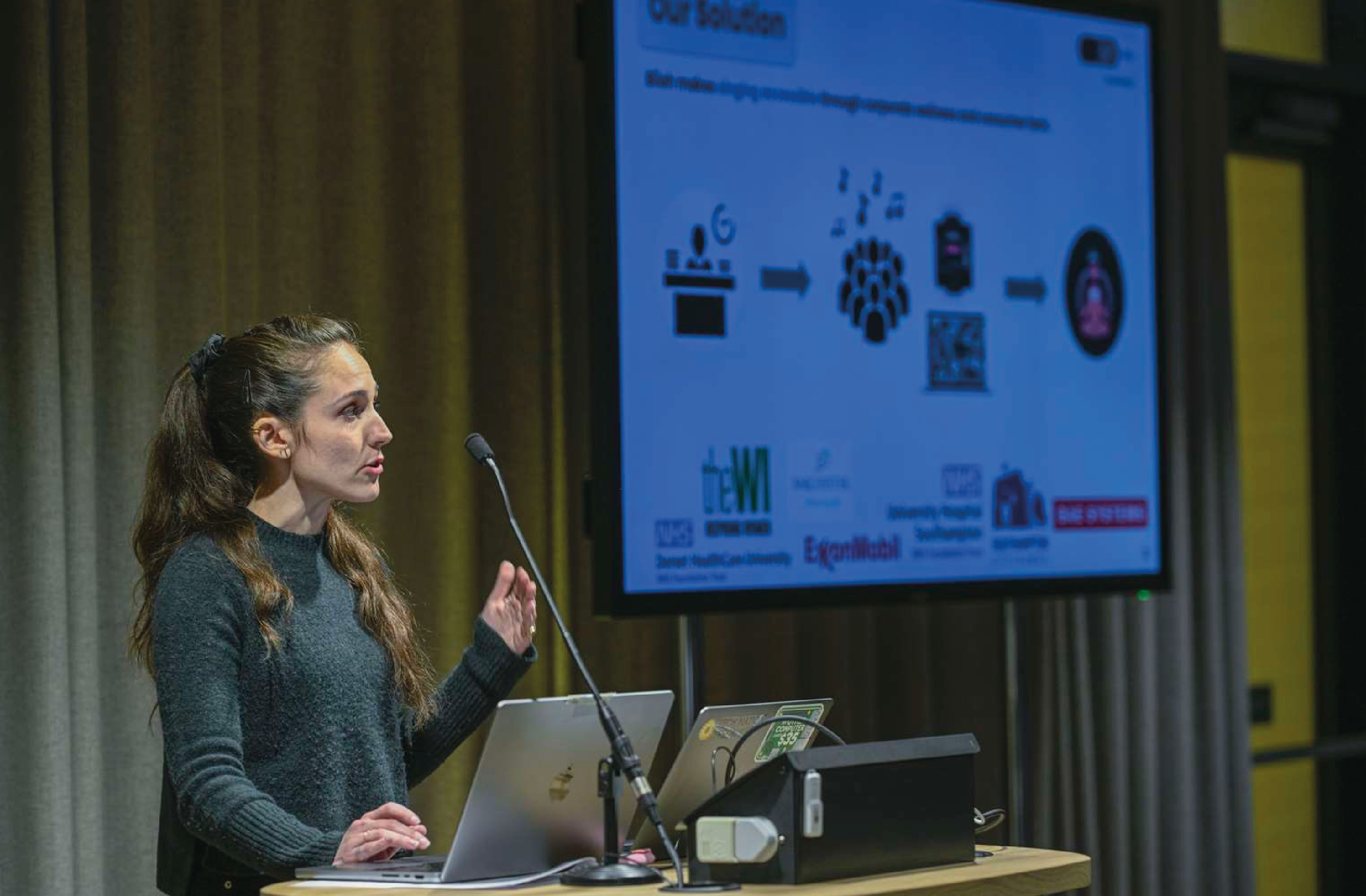
What does someone mean when they say “I can’t sing”? That they can’t remember a melody or song lyrics? They can’t seem to hit the same notes as singers in their favourite bands? That they can’t sing in tune? That it doesn’t sound good?
Why do some people think that they can’t sing? Is it something you ‘just know‘? Have you had a bad experience singing in school? Is it something you have been told? Is it a comparison to someone else around you? Do you trust the person telling you? Could they have been joking or did they mean it?
A common thing we hear when we talk to people about Biiah is “Oh, I can’t sing”, but what does this actually mean? We want to focus our first article on the common myths associated with singing ability – hopefully encouraging those of you who think I can’t, to believe that maybe I can.
What Shapes Our Singing Fears?
Some studies have found that the belief ‘I can’t sing’ is often rooted in a bad childhood experience [1] [2]. An American research study [3] found that singing anxiety was highest in a social context, where participants were concerned that they would be personally evaluated by others. They traced the roots of their anxiety to negative experiences in school music programs when they were younger. A common belief was that singing ability was something you were born with and couldn’t learn.
The ability to make music is something that comes to you when you are really young … you just have it or you don’t.”
Melanie (aged 21)
I just don’t have much musical talent so I get very nervous if I have to sing.”
Joan (aged 55)
I didn’t realise you could be taught to sing. I just thought you were born with it.”
Melissa (aged 22)
What if Someone is Listening?
Have you seen the karaoke performance by Cameron Diaz in My Best Friend’s Wedding? The actor confesses it was more than just acting, she “allowed the true terror of singing in front of people to be alive in me…when you’re standing there by yourself it’s terrifying”. The scene pivots from terror to triumph when the audience applauds her courageous performance… but what if that doesn’t happen?
You choose a song that you know, you have the lyrics, and they are presented in time with the music, in a way that suggests when to sing them. So far so good, but you don’t have support for singing the tune. You are also standing up there with a microphone – alone (cue the ‘eek’ moment). Many of the people watching you know the song and the way it’s ‘supposed to sound’, but the track that the audience knows has been recorded in a studio, with mixing and mastering to make it sound as good as possible (maybe with some auto-tuning…). It’s very hard for anyone to measure up. That’s a lot of pressure!
Live music performance can be highly stress-inducing, no wonder when you consider that it typically involves the simultaneous coordination and execution of complex cognitive, perceptual, motor and social skills in front of an audience [4]. The fear that your singing might be judged negatively by others is very powerful. Despite all of that, Karaoke can be lots of fun, or no-one would do it, but it depends on who you are with and how you feel about singing in front of them. However, if it isn’t for you, it doesn’t mean you can’t sing. Singing within a friendly group of other singers is a very different experience with lots of evidence for social, medical and mood enhancing benefits (more on this in future posts).
Even the most seemingly confident people have doubts about their singing ability. Iconic Great British Bake Off judge Prue Leith is calmly confident in the Bake Off tent but less confident about her singing voice. In an interview with Hilary Rose for The Times she says that she would love to be able to sing in tune, and has tried to join a local singing club, “But round here they’re so posh that the only singing group I rang up said you have to audition and you can never miss a rehearsal.”
In a recent survey carried out by Biiah to understand the barriers to choir participation, many people told us that the pressure of work commitments and childcare made it difficult to make a regular rehearsal commitment. But for some people, anxiety around being judged when singing with others is a barrier to even making that first step.
I Can’t Sing in Tune
Singing anxiety depends in some part on how, where and why you sing. If you are in the shower, gardening or in your car alone on a sunny day, singing along to your favourite song on the radio, it doesn’t really matter how you sound as long as you are enjoying it. It’s a great way to let off steam and take your mind off other things. It doesn’t matter whether you are singing in tune as no one else can hear you! Anxiety starts to creep in when you are around other people who can hear you. Singing in a choir requires you to coordinate your performance with the other singers – and this means, amongst other things, singing in tune – cue the nerves. If this is you, don’t worry, you are not alone and we think we can help.
I Want to Sing
Singing has so many positive benefits for physical and mental health. No wonder it has become so popular in the last decade, supported by TV shows like Glee, the BBC’sThe Choir, or movies like Pitch Perfect. As the founder of Rock Choir puts it:
“There’s joy in the sound of the human voice coming together.”
Caroline Redman Lusher, founder of Rock Choir [5]
Many choirs welcome singers on a ‘no audition’ basis. They are a place to meet new people and enjoy singing in a relaxed environment. The repertoire is broad, encompassing music genres such as rock, pop, gospel, contemporary and jazz as well as more traditional choral music. Choir Directors use their skills and knowledge to help every member sing as well as they can. They know that a choir where everyone is obviously enjoying singing together is much more fun for the audience to experience than one where no-one is moving or smiling, even if they are note perfect.
Yet singing fears can be so deeply ingrained, that even when you have plucked up the courage to take part, you still doubt your singing ability. A research study of members of a ‘Can’t Sing Choir’ followed a group of new adult singers over a 6 month period. Some singers improved so much that they felt that they could join a more advanced choir, or developed the confidence to sing a solo. Yet, negative self-beliefs still persisted, supporting evidence from other research that belief in yourself and confidence are key to improvement [1].

Biiah is developing the app Biiah with content devised by experienced tutors, who will guide you through developing the skills and knowledge you need to grow confidence in your singing, and help you to look after your voice. There are lessons, tools and tips to help you to enjoy singing, just for yourself, or with others. Biiah is driven by knowledge, and as part of our journey we are examining existing research around learning to sing and its benefits, and talking to lots of people just like you. We want to understand the root of singing anxiety for new singers, so that we can develop the best tools to help. We believe it is possible to develop the skills and confidence to make that first step towards “I can sing!“.
We Need Your Help
We have already run a survey which received hundreds of responses, looking at the barriers to being in a choir and challenges of practicing between rehearsals and learning parts. We are also analysing the huge body of research that has already been carried out into the benefits and challenges of learning to sing. We will share some of this knowledge regularly here, in a series of articles over the coming weeks and months.
Author: Dr. Sam Duffy
Research References
[1] Richards, H., & Durrant, C. (2003). To sing or not to sing: A study on the development of “non-singers” in choral activity. Research Studies in Music Education, 20(1), 78–89.
[2] Welch, G. (2016). Singing and Vocal Development. In G. McPherson (Ed.), The Child as Musician: A Handbook of Musical Development (Second). Oxford University Press.
[3] Abril, C. R. (2007). I have a voice but I just can’t sing: a narrative investigation of singing and social anxiety. Music Education Research, 9(1), 1–15.
[4] Fancourt, D., Aufegger, L., & Williamon, A. (2015). Low-stress and high-stress singing have contrasting effects on glucocorticoid response. Frontiers in Psychology, 6, 1242.
[5] A UK Crescendo of Choirs by Caroline Sullivan, The Guardian, 4 November 2010 https://www.theguardian.com/music/2010/nov/04/choirs-rock-choir-fron-glee




